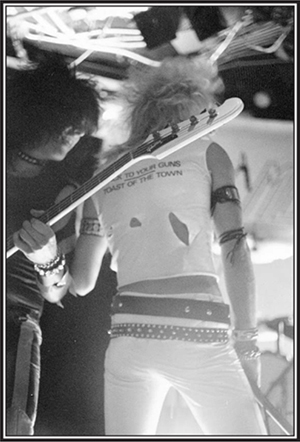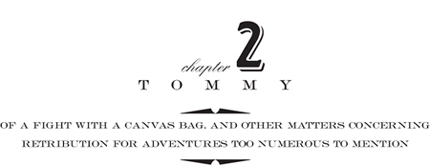The Dirt (39 page)
Authors: Tommy Lee

Finally, despite Nikki smarting off the whole time, he was released at five in the morning. I stayed in the station taking care of paperwork all day and, when I finally returned to my hotel room that night, ready to collapse, who should come banging on the door but Vince. He was smashed and trying to fuck the girlfriend of some Yakuza gangster. But, at the same time, his brain-dead L.A. girlfriend had just arrived in Japan and was in his room. So he’s pissed off because he doesn’t want to deal with the latest mess his dick has gotten him into.
“Fire the travel agent,” he slobbers.
“What?”
“Fire the fucking travel agent!”
I had taken all I could take that day. I smashed him in the face, closed the door, and sank into a peaceful sleep. That’s how it was with those guys: We would punch the shit out of each other all the time. I called it fullcontact management.
When, a few days later, Nikki said he was traveling to Hong Kong, Thailand, and Malaysia with nothing but a pack of rubbers, I considered further violence. I knew I’d have to tag along and baby-sit, because if I didn’t he’d wind up dead or lost or sold into white slavery. Fortunately, he didn’t make it any further than Hong Kong, where he ordered something like 150 prostitutes in two days. I could have killed him when he sent a dozen giggling prostitutes to my door while I was on the phone with my family.
Of course, Nikki wasn’t sexually active then. He probably just talked and talked and talked to the poor hookers until they came to the conclusion that no amount of money was worth this torture. He was a stone-cold junkie, and he was pretty bad off. When we returned to California in December, I started getting calls in the middle of the night from the security company that protected his house because they’d answer alarms only to find him slithering around his yard with a shotgun.
A few days before Christmas, I went to dinner with Bob Krasnow of Elektra. “So,” he said. “How are the guys doing?”
“They’ll be okay,” I said, “if they can stay alive.”
Then, just after dinner, Doug called. Nikki had overdosed in some hotel room and they thought he was dead. I shouldn’t have been surprised, but I was. After shock came disgust. Then came disappointment. I was upset with myself for being involved with a band like this and for, in some way, allowing these guys to get away with behaving like animals. Especially now that one animal had killed himself.
When I found out that Nikki was actually alive and had escaped from the hospital, I knew what I had to do. I went into the office, called Doug to my desk, and told him, “I’m not doing this. I’m not going to watch people die.”
They had a European tour scheduled, and there was a better chance of them coming home in body bags than on the Concorde. We canceled the tour and went in search of Nikki. No one answered his phone, but he had changed his answering machine message, so we knew he had been there. We drove to his house, and found him knocked out in his bathroom with blood all over the walls. He was lying there in leather pants and no shirt, smacked out and incoherent. I talked him into coming to my house to detox. The problem with Nikki is that as far as he’s concerned, nothing controls him. He controls everything. But in this case, heroin was a much bigger power than he was prepared to reckon with.
Nikki stayed at my place in Tarzana for almost a week. Bob Timmons came over every day to try to keep him sober and Steven Tyler of Aerosmith, who had taken an interest in Nikki, called every day to bully him into straightening up. “You’re going to die,” he’d tell him. “You’ve got to see it.” Finally, Nikki broke down. He admitted to us for the first time that he couldn’t control his addiction. We called in the rest of the band and held a big meeting in my living room. They looked pathetic. There was Nikki, who was dying; Tommy, who was getting loaded and fighting with his wife; Vince, who was completely out of control; and Mick, who basically woke up every morning and drank and sobbed to himself until he passed out. And this was supposed to be one of the biggest, greatest rock bands in the world.
Doug and I told them, first, that they were going to pay back the promoters in Europe for their cancelled tour out of their own pockets. Second, they were either going to straighten up or find new management. We presented a united front. Nikki admitted that he needed to check into a hospital, something he had never agreed to before. Tommy, who’s so easily led he’d drink Kool-Aid if Jim Jones asked him to, said he was in, of course. Vince, stubborn and in denial, dragged his heels and waffled. And Mick just gave us a funny look.

fig. 2


I
was the first one to go. Part of me didn’t want to do it, but we were all partying too hard. So we made a pact and, being a team player and shit, I checked into rehab first.
I wasn’t as bad off as Nikki or Vince, but I was drinking like a maniac, smoking weed, and every once in a while I’d fuck around shooting heroin with Sixx. That drug was so fucking good it scared me.
I didn’t think I had any problems, though, until I checked into this place in Tucson called Cottonwood. There was this doctor there who brought all this shit to the surface that I had never even really thought about.
On my second day there, he made me sit in a room while he stood behind me. There was nothing else around except for an empty chair across from me. The doctor said that I should look at the empty chair and imagine that my addiction was sitting there. Then he would say things and I was supposed to imagine that it was my addiction speaking to me.
It seemed stupid at first, but after a while I started to believe it. “I know you love me,” my addiction said. “You think about me all the time. You can’t live without me.”
Suddenly, all this anger came to the surface and I jumped up and freaked out: “Wait a minute,” I yelled at the empty chair. “Fuck you. I can fucking live without you.”
“That’s good. I want you to talk back to your addiction,” the doctor said. “I want you to get mad at it. I want you to destroy it. It is not your friend. It is your enemy.”
Then he replaced the chair with a heavy canvas sack and handed me a fucking baseball bat. I ran over and started beating the shit out of this fucking addiction sack, dude, and full-blown tears were flying out of my face.
“Show it how you feel,” the doctor kept egging me on. “It wants to hurt you. Get it out of your life.”
I kept going crazy on the bag while bawling like a baby. It was like an exorcism, bro. I’ll never forget that fucking experience because I realized that there was some other force that had been controlling me for years and it was the first time I had communicated with it. I didn’t know until then how powerful that force was, and how powerful it wasn’t. Addiction is only as strong as you let it be, and I had let it become too powerful.
There was a sign on the wall at Cottonwood that said “Silence = Death.” And I’ll never forget that phrase, because it made me think of my childhood. My parents were always cool, but whenever I did something wrong, I was punished with silence. They’d send to me to my room and when I asked what I did wrong, they wouldn’t speak to me. So I’d sit in my room wondering what the fuck I did and why no one would talk to me. My parents thought that was how they were supposed to teach me a lesson. So from an early age I equated silence with punishment. When I became older, nothing would piss me off more than someone not talking to me. It still fucking gets to me if a girl doesn’t call back or if I do something wrong and get the silent treatment from a friend. Dude, I want to crawl into a hole and die every time. So when I saw that sign in rehab, “Silence = Death,” I said to myself, “You know what? That’s exactly what it fucking felt like as a kid.”
Everyone in the band was in a different program. But after a week or so, Bob Timmons thought that we should be together as a group. So they all flew down to meet me. We stood in a circle with some other people in the clinic, put our arms around each other, and sang “You Can’t Always Get What You Want,” which was probably the perfect message for a band like us, because we were all so used to getting exactly what we wanted whenever we wanted it.
The spigots controlling my eyes turned on again, and I turned to Nikki and sobbed, “Isn’t this the most beautiful song, dude?” And he looked at me like I was crazy, then looked at Mick and whispered something about me falling for this Jim Jones shit. I don’t think anyone in the band ever took me seriously. I was seen as the puppy dog whose paws were too big and always tripped over everything.
But then, after singing, we all sat down. The counselor asked us to visualize ourselves as little boys, and all of a sudden Nikki broke down. His face turned red, and he was so choked up he couldn’t speak a word. Later, he said that he visualized himself at one end of a street with his mother at the other end, and he realized that all his unresolved bitterness and resentment toward his mother and father were still haunting him. If I was the goofball that they were learning had a genuine sadness behind the mask, Nikki was the madly charging ram who we learned had a tender spot, where real feelings and emotions lay.
Even Vince, the most impenetrable of us all, began to open up and cry. For the first time, I saw a weakness in Mötley Crüe that I had never noticed before. We all turned into broken-down little children, except for Mick, who was being strangely stubborn and refused to open up. Every time we sang together or meditated or went through any exercise to get in touch with our emotions, I’d look at him and he’d have an expression on his face like he was about to vomit all over the floor.


